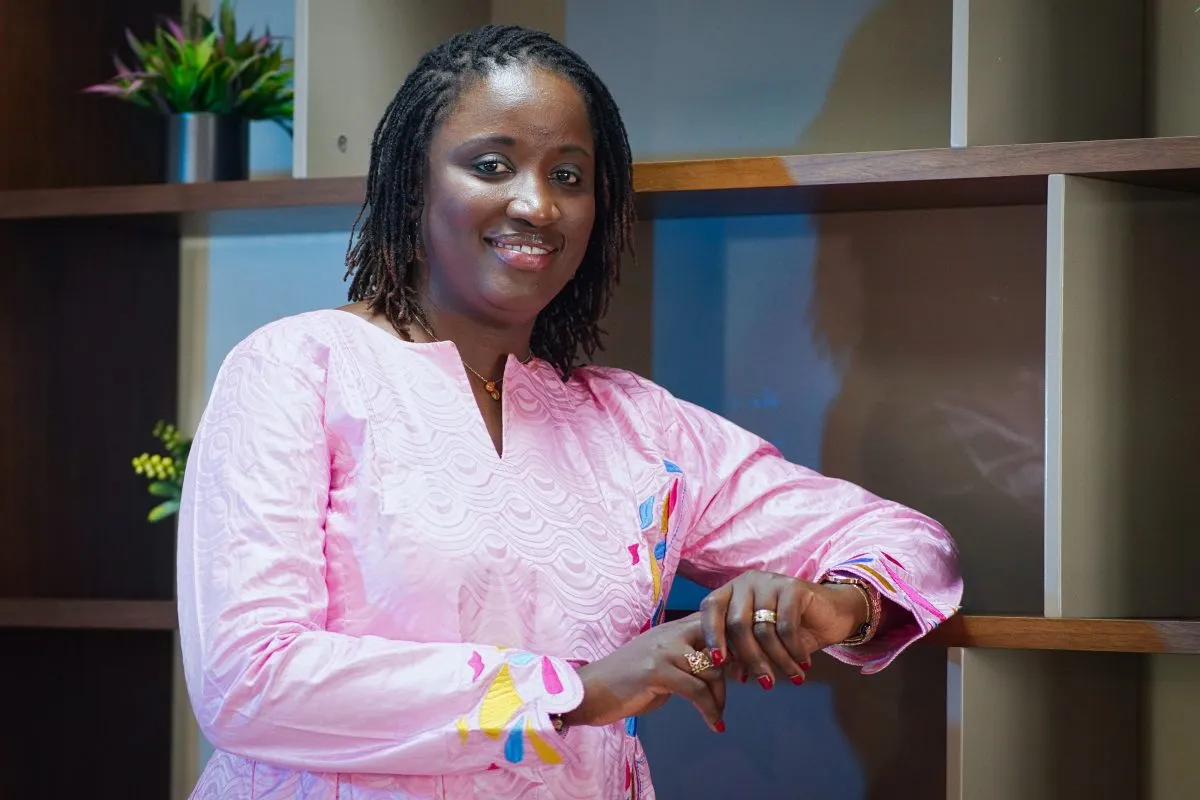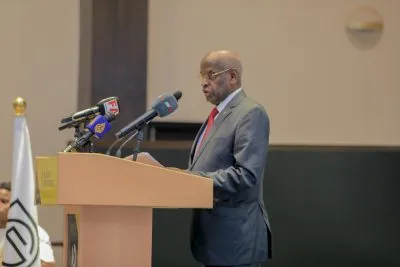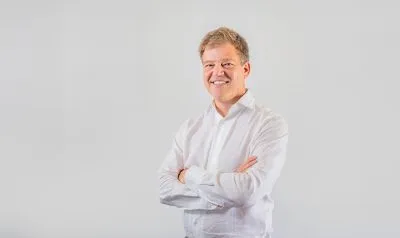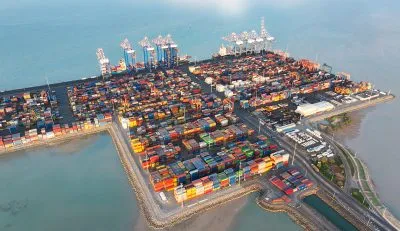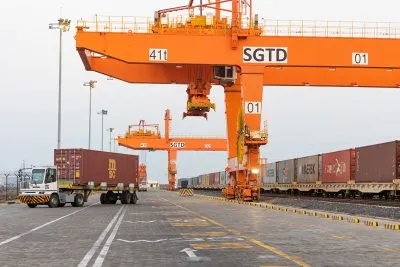Coura Sène is usually media shy, so when she agreed to be interviewed we jumped at the opportunity. Wave is a success story in digital payments. We meet Sène at its West African headquarters, a building in the shape of a rocket that seems to be hurtling towards the sky. Five years after its arrival on the Senegalese market, Wave has dethroned the incumbent operator Orange Money – operated by the French telecommunications group Orange – and pushed the latter to lower its transaction rates by nearly 80%.
Wave, an app-based payment solution, raised $200m back in September 2021. It has now expanded into three other countries of the West African Economic and Monetary Union (WAEMU) – Côte d’Ivoire, Burkina Faso and Mali – as well as Uganda and The Gambia.
But it is its operation in Senegal that acted as a catalyst to its regional growth and provided the blueprint for its current business model. As Sène, who is seen as one of Africa’s emerging stars amongst the fintech community, outlines in this interview, the country is on its way to become an increasingly cashless society, thanks to the promising future of mobile money.
African Business: Wave was initially based in East Africa, a leading area in mobile money. Why are you interested in the West African market?
Coura Sène: The two co-founders of Wave, Drew Durbin and Lincoln Quirk, are Americans. They first created Sendwave in 2011, as a mobile application that allows the East African diaspora based in the US, Canada or England to send money to their loved ones instantly, using technology, at a lower cost.
When they moved to Senegal, they wanted to do the same thing: facilitate international money transfers. But they couldn’t find partners to set up this service. At the same time, they realised that an inclusive mobile money service, similar to what M-Pesa was doing in Kenya, was missing in West Africa. This is what drove them to move into this niche.
Today, at least 75% of Senegalese adults have a Wave account that they use daily or monthly, which is just over six million users. As we have enhanced our product and extended our reach, this has led to greater competition and actually more choice for the customer. We have seen how the competition has lowered its transaction prices and revised its interface. Today at Wave we have more than ten million users in the six countries where we operate – Senegal, Côte d’Ivoire, Burkina Faso, Mali, Uganda and Gambia. And these numbers are constantly growing.
You’ve become the market leader in under five years. To what do you attribute this success?
We have a simple offering: affordable mobile financial services, tailored to individuals’ and businesses’ needs. Our services allow people to send and receive money, pay bills and securely make purchases.
We started our activities in February 2018 in Senegal, in partnership with the Nigeria-based bank UBA, and then with a second partner bank, Ecobank. Last April, we got a direct licence from the BCEAO [the central bank of the WAEMU countries], which allows us to operate without intermediaries. We would now like to extend this licence to the other countries of the WAEMU.
But, to answer your question more specifically: when we entered the Senegalese market we sought to understand the needs of customers in terms of digital financial services, which allowed us to design the most inclusive financial product existing in the mobile money environment. We designed a simplified customer journey – and the technology we use allows us to be effective in terms of customer service and handling complaints, all of which helps build trust.
We’ve also created a product that allows us to be extremely competitive from a cost perspective. Deposits and withdrawals are free. The fee for money transfers is only 1%. Our priority is to make a product that is affordable and that is tailored to a wide range of customers, those in rural communities as well as the urban centres, the more educated as well as the less-educated groups, the young and technology-savvy as well as those that are not. In short, we wanted to increase financial inclusion and make banking services easy to access for all.
You deploy agents in the field to convince merchants, whether formal or informal, of the advantages of mobile money. How does this work exactly?
We have teams of young people who go out into the field to explain to customers how to use Wave. They go out to market with vendors, artisans, and informal shopkeepers to describe the product. Today, many everyday products and services can be purchased via a QR code.
In Senegal, less than 25% of the population is banked. How do mobile money services like Wave enable better financial inclusion?
According to BCEAO figures, Senegal’s broader bancarisation rate has risen from 39.6% in 2020 to 42.4% in 2021, thanks to mobile money services like Wave. I want to point out that the number of banked people is constantly rising. The number within the traditional banking sector has tended to stagnate for the past twenty years.
You should know that in Senegal some people are not even registered [with an identity card], which means they are excluded from everything. Others have no regular income and, therefore, cannot have a bank account. Mobile money applications make it possible to incorporate them within the system.
Peanut sellers or cab drivers can now track their transactions and, better, estimate their turnover. In itself, our job is to digitise the informal. This benefits everyone, including the government, which can collect taxes on digital transactions.
How many transactions did you process last year in the Senegalese market?
In 2022, the application recorded 12 billion transactions in Senegal. We are present in the informal and formal markets, such as the retail sectors. In 2021, we signed a partnership with the French supermarket group Auchan, which has about 40 points of sale in the country. For them, Wave has been instrumental in reducing the proportion of cash payments, which is something they were also wanting to achieve. Our arrival on the market has allowed us to develop mobile money transactions significantly.
How do you plan to continue to develop?
In the short term, we are working on diversifying our financial products. We started with bill payments. Before, paying your water or electricity bill was a real headache: you had to wait in line for hours at your local utility branch. You can now do it from your phone.
Today, we would also like to develop in the transport sector. Customers will soon be able to pay for their TER [rail] tickets via Wave, for example. I believe mobile payment has an essential role to play in urban mobility, one of Dakar’s major issues.
We are also continuing to develop in the retail sector, and we would like to move up the value chain all the way to the suppliers. We want to make the African market more dynamic by digitising payments as much as possible. Our competitor is cash. Its use is harmful to everyone, whether it is for small informal players or the state.
What’s next? In the next five or ten years?
We would like to move towards second-generation products, such as savings or access to credit, financial products that are not available to the unbanked. For example, a fish seller at the market needs to grow her business and buy supplies. How can we give her access to financing?
Recently, we partnered with the Délégation Générale à l’Entrepreneuriat Rapide des Femmes et des Jeunes (DER/FJ). The beneficiaries were able to receive funding via the Wave application. We want to grow these types of initiatives.
Do you plan to collaborate more with banks in the future?
We can serve as an intermediary for banks to distribute loans, because they are the ones who are currently authorised to grant loans. Tomorrow, we can also be the channel for the distribution of bonds and securities issued by the state, which is a way of saving money – today, most of the population does not have access to them.
So the idea is not to replace the banks in the long run?
On the contrary, the banks see us as complementary. They operate within a strict regulatory framework. Our vision is to be an intermediary, enabling them to reach the unbanked.
Some people believe that your model is not profitable. How do you respond to the sceptics?
Like any new business, there is an investment plan – meaning that we lose money when we start our activities. But we were able to convince the BCEAO to grant us an e-money licence, because our model is viable. Today, Wave employs 850 people in Senegal, with a network of 13,000 agents; all this we have built in five years.
West Africa is currently experiencing a revolution in the mobile money sector. Our long-term vision is that our customers will favour our products over cash.
Read more about Senegal’s booming economy in our Senegal Dossier.
Want to continue reading? Subscribe today.
You've read all your free articles for this month! Subscribe now to enjoy full access to our content.
Digital Monthly
£8.00 / month
Receive full unlimited access to our articles, opinions, podcasts and more.
Digital Yearly
£70.00 / year
Our best value offer - save £26 and gain access to all of our digital content for an entire year!

 Sign in with Google
Sign in with Google 